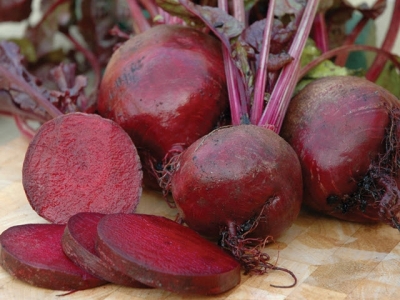Latest vegetable seeds

Peter Mashala highlights new vegetable cultivars now available.
Red Atlas F1 beetroot
Beans
‘Star 2054’ (Starke Ayres): An extra fine bean variety with very slow seed development.
‘Volta’ (Hygrotech): A vigorous plant that performs well in warm conditions. The pods are fine, dark green and setting occurs over time, making harvesting easier. Resistant to rust and halo blight.
Beetroot
‘Red Atlas F1’ (Starke Ayres): A widely adaptable early-maturing hybrid.
Broccoli
‘Topaz’ (Starke Ayres): An all-year-round variety good for all areas with excellent uniformity and yield. Suitable for processing and punnets. Takes 65 to 75 days to mature in summer and between 90 and 120 days in winter.
Butternut
‘Gilda’ and ‘Shiba’ (Starke Ayres): High-yielding hybrid squash varieties, with a uniform size and shape and thick neck.
Cabbage
‘Ruby Ball’ (Starke Ayres): A baby red variety which can be sown from January to December. Shows good resistance to disease such as black rot. For baby cabbage production, it can be planted at a density of 100 000 to 105 000 plants/ha. Depending on the market, the ideal weight for such heads should be between 80g and 150g. For medium-size heads, density should be from 40 000 to 45 000 plants/ha, with a weight of up to 2kg each. Matures from 80 to 120 days in winter and from 60 to 65 days in summer.
Eggplant
‘Kaberi’ (Seedcor): Vigorous plants produce a beautiful mini tear-shaped purple fruit ideal for pre-packing.
Pepper
‘Clair’ (Hygrotech): Has good production potential under hot and cool conditions with firm, medium to large blocky fruit with an average weight of 300g from 25 000 to 30 000 plants/ha. Resistant to the Tobamovirus group, Xanthomonas vesicatoria, tomato spotted wilt virus, potato virus Y and tobacco etch virus. The fruit turns from dark green to a deep red.
‘Rhemus’ and ‘Selene’ (Starke Ayres): Hybrid medium-size sweet pepper varieties which turn dark green to deep red when mature. Resistant to tomato mosaic virus and tomato spotted wilt virus, among others.
Pumpkin
‘Star 7026’ (Starke Ayres): Can maintain fruit size in cool conditions. The fruit is heavy, with thicker flesh, and can take up to 120 days to mature in winter.
‘Winston’ (Hygrotech): A grey vine-type with average disease tolerance against zucchini yellow mosaic virus and watermelon mosaic virus. The fruit weighs up to 8,5kg and has a dark orange interior.
Sweetcorn
‘Rustico’ (Hygrotech): Mainly for the export market, this produces high quality cobs with a sweet taste and long shelf life. Has intermediate resistance to rust and is resistant to northern corn leaf blight.
‘Star 7718’ (Starke Ayres): A high-yielding variety with cylindrical ears.
Tomatoes
‘Alfar’ (Hygrotech): An indeterminate large round tomato for open fields or greenhouses. The plant sets well under warm conditions. The fruit turns from a uniform green to a deep red, is firm with a long shelf life. Resistant to tomato mosaic virus, tomato spotted wilt virus, tomato yellow leaf curly virus and some strains of Verticillium and Fusarium, as well as all root knot nematodes.
‘Degas’ (Hygrotech): Produces vigorous plants which can grow up to 1,5m high with excellent leaf coverage and good fruit set. The fruit is an open field, determinate, fresh market variety with a long shelf life. Resistant to Verticillium, Fusarium, tobacco mosaic virus and all root knot nematodes.
‘Tores’ and ‘Yakira’ (Starke Ayres): Indeterminate round tomato varieties. Yakira is resistant to Verticillium wilt, Fusarium wilt race 1 and 2, tobacco mosaic virus, tomato yellow leaf curl virus and all root knot nematodes. Tores is resistant to Verticillium wilt, Fusarium wilt race 1 and 2, tobacco mosaic virus, tomato spotted wilt virus and tomato yellow leaf curl virus.
Watermelon
‘Waddie’ (Hygrotech): A sweet hybrid, diploid and a superb triploid pollinator. Has outstanding vigour and a high fruit-set, and fruit that matures in under 100 days. It can weigh up to 12kg and is resistant to anthracnose and Fusarium.
Zucchini
‘Aretusa’ (Hygrotech): Produces uniform, dark green cylindrical fruits that mature within 50 days. Resistant to zucchini yellow mosaic virus and watermelon mosaic virus.
Related news
 Organically grown vegetables VS conventionally grown vegetables
Organically grown vegetables VS conventionally grown vegetables The answer is yes and no. IT depends. A prime benefit of organic produce is that it’s free of pesticide residue, which is blamed for the progressive increase
 Farming for the next generation
Farming for the next generation Diversification and crop rotation keep Petrus van der Walt busy 12 months of the year. But the bottom line has been worth the effort for this 2011 Limpopo
 Understanding citrus – 1
Understanding citrus – 1 Citrus trees are planted in rows in orchards or groves and can take three years to start bearing fruit ready to harvest and sell. Growing citrus is a long-term